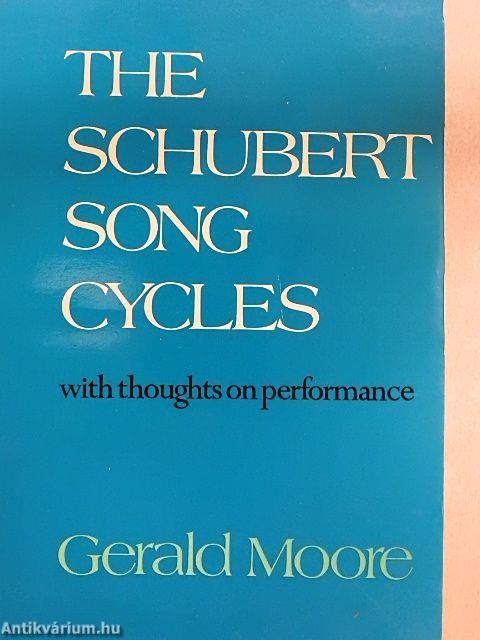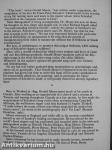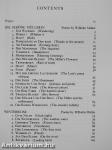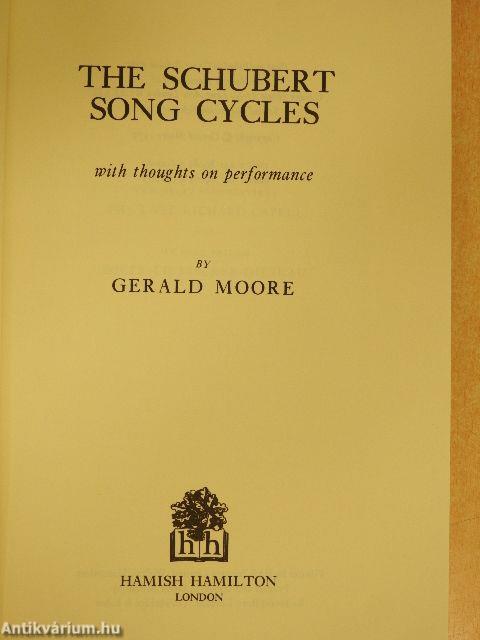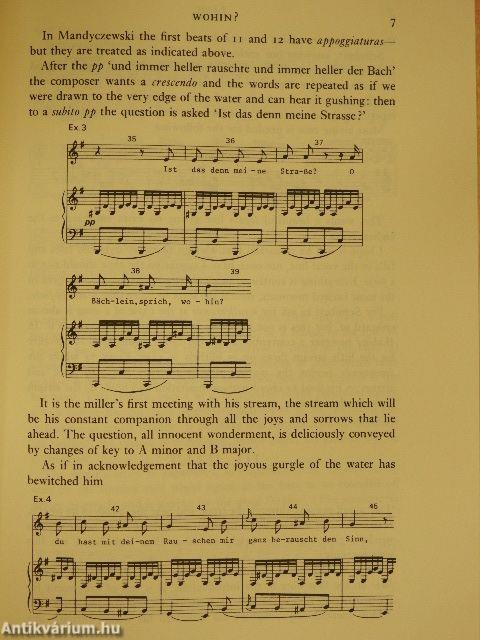1.067.339
kiadvánnyal nyújtjuk Magyarország legnagyobb antikvár könyv-kínálatát

VISSZA
A TETEJÉRE
JAVASLATOKÉszre-
vételek
The Schubert Song Cycles
With thoughts on performance
| Kiadó: | Hamish Hamilton |
|---|---|
| Kiadás helye: | London |
| Kiadás éve: | |
| Kötés típusa: | Varrott papírkötés |
| Oldalszám: | 240 oldal |
| Sorozatcím: | |
| Kötetszám: | |
| Nyelv: | Angol |
| Méret: | 23 cm x 13 cm |
| ISBN: | 0-241-89165-5 |
| Megjegyzés: | Kottákkal. |
naponta értesítjük a beérkező friss
kiadványokról
naponta értesítjük a beérkező friss
kiadványokról
Előszó
TovábbFülszöveg
"This book", writes Gerald Moore, "was written under compulsion, the compulsion of my love for Franz Peter Schubert. I find myself in the evening of my life turning more and more to the master whom Artur Schnabel described as the composer nearest to God."
Most distinguished of living accompanists. Dr. Moore has now set down his thoughts on how singer and pianist can, in what Richard Capell called "an understanding between friends", convey the essence of Schubert's art to the listener. Schubert's great secret, says Dr. Moore, was that he was able to speak to the heart. "No one ever expressed himself with such utter lack of artificiality; so spontaneous is his song that the process of transplantation from mind to manuscript without loss of freshness or bloom is miraculous."
But how, in performance, to preserve this unique freshness, while missing none of Schubert's depth or subtlety ?
Here, with a wealth of detail for which every student and lover of Lieder will owe him lifelong... Tovább
Fülszöveg
"This book", writes Gerald Moore, "was written under compulsion, the compulsion of my love for Franz Peter Schubert. I find myself in the evening of my life turning more and more to the master whom Artur Schnabel described as the composer nearest to God."
Most distinguished of living accompanists. Dr. Moore has now set down his thoughts on how singer and pianist can, in what Richard Capell called "an understanding between friends", convey the essence of Schubert's art to the listener. Schubert's great secret, says Dr. Moore, was that he was able to speak to the heart. "No one ever expressed himself with such utter lack of artificiality; so spontaneous is his song that the process of transplantation from mind to manuscript without loss of freshness or bloom is miraculous."
But how, in performance, to preserve this unique freshness, while missing none of Schubert's depth or subtlety ?
Here, with a wealth of detail for which every student and lover of Lieder will owe him lifelong gratitude, Gerald Moore examines each of the fifty-eight songs in the three Schubert song cycles, Die schöne Müllerin, Winterreise (in the author's opinion the greatest song cycle ever written) and Schwanengesang.
No one has ever before analysed these masterpieces so penetratingly and, above all, so practically. That Gerald Moore's retirement from the concert platform has given him time to write this book will be some consolation to his innumerable admirers; for posterity, and in particular for future interpreters of Schubert's Lieder, it will greatly extend his already legendary fame.
Born at Watford in 1899, Gerald Moore spent much of his youth in Canada. After working as an organist both in a church and a cinema in Toronto and touring throughout Canada as a boy pianist, he first made the acquaintance of Schubert's song cycles when accompanying Campbell Mclnnes, the well-known singer (and first husband of Angela Thirkell). "I really believe the music of these marvellous songs laid the seeds of my future career", he wrote in his autobiography Am I Too Loud? (Hamish Hamilton, 1962).
Moore returned to England and while still in his twenties established himself as one of London's leading accompanists. He has played for the world's finest singers and has performed and recorded these cycles with such distinguished artists as Dietrich Fischer-Dieskau, Hans Hotter, Hermann Prey, Elena Gerhardt, Pierre Bernac, Peter Pears and Thomas Hemsley.
At his farewell recital at the Royal Festival Hall in 1967 he was joined by three stars, Victoria de los Angeles, Elizabeth Schwarzkopf and Dietrich Fischer-Dieskau.
Since retirement he has continued to make records, lecture, broadcast and give master classes on accompanying. He lives at Penn, Bucks. Vissza
Témakörök
- Idegennyelv > Idegennyelvű könyvek > Angol > Művészetek > Zene
- Művészetek > Zene > Komolyzene > Korszakok > Bécsi klasszicizmus > Egyéb
- Művészetek > Zene > Komolyzene > Korszakok > Romantika
- Művészetek > Zene > Komolyzene > Elmélet
- Művészetek > Zene > Komolyzene > Zeneesztétika
- Művészetek > Zene > Komolyzene > Zenetörténet > Külföldi
- Művészetek > Zene > Komolyzene > Idegen nyelv > Angol
Gerald Moore
Gerald Moore műveinek az Antikvarium.hu-n kapható vagy előjegyezhető listáját itt tekintheti meg: Gerald Moore könyvek, művekMegvásárolható példányok
Nincs megvásárolható példány
A könyv összes megrendelhető példánya elfogyott. Ha kívánja, előjegyezheti a könyvet, és amint a könyv egy újabb példánya elérhető lesz, értesítjük.



